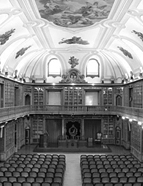

During the three decades in question, the Lisbon Academy of Sciences (ACL) naturally underwent several phases. With the Vintism movement, it sought to adapt to the challenges of the first liberal experience, contributing to public debate on convening the Cortes. However, its institutional nature and funding were criticised in a session of the Sovereign Congress on 9 January 1823. It continued to engage in intense publication activity, producing sources and memoirs, although no longer with the brilliance and vigour of earlier eras, such as the Memórias Económicas [Economic Memoirs] and Memórias de Literatura [Literary Memoirs]. With the deaths of António Ribeiro dos Santos (1818), António Caetano do Amaral (1819), and José Francisco Correia da Serra (1823), and the departure of João Pedro Ribeiro to Porto, the Portuguese literature class was diminished, particularly in terms of its founding members or those who had driven what could be considered the golden age of the ACL in terms of sources and historical studies (1789-1814). The class still included notable figures, historians and scholars such as Fr iar Francisco de São Luís, the lecturer in Diplomatics Francisco Ribeiro Dosguimães, Francisco Manuel Trigoso de Aragão Morato, and Joaquim José da Costa de Macedo, all of whom participated in various historical commissions. Sebastião Francisco de Mendo Trigoso, director of the Colecção de Notícias para a História e Geografia das Nações Ultramarinas [News Collection for the History and Geography of the Overseas Nations], sought in particular to extend the inquisitive spirit of the work of Ribeiro dos Santos and Francisco Borja de Garção Stockler on the Portuguese discoveries, with some support from isolated works by Costa de Macedo. Following in the footsteps of João Pedro Ribeiro, Dosguimarães continued to teach Diplomatics at the Torre do Tombo (where Alexandre Herculano would become his student), and Trigoso de Aragão Morato sustained the scholarly study of Portuguese institutions. Figures such as F r. Francisco de São Luís and D. Francisco Alexandre Lobo studied the themes of national language and l literature, central to the ACL's own definition of its purpose. Another line of research, that of legal and legislative sources and institutions, was pursued with enthusiasm by João Pedro Ribeiro and José Anastásio de Figueiredo.
